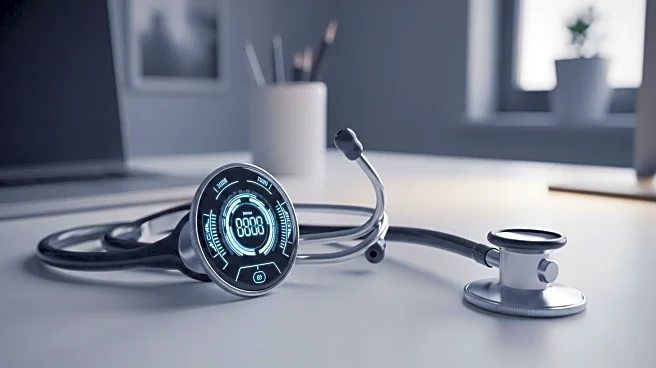What's Happening?
Researchers at Imperial College London, in collaboration with Imperial College Healthcare NHS Trust and Eko Health, have developed an AI-powered stethoscope capable of diagnosing heart failure, atrial fibrillation, and heart valve disease in just 15 seconds. This innovative tool, which resembles a traditional stethoscope but is enhanced with advanced AI and ECG capabilities, analyzes subtle differences in heartbeat and blood flow that are undetectable to the human ear. Trials involving over 12,000 patients across the UK demonstrated that the AI stethoscope significantly increases the likelihood of early detection for these conditions, potentially saving lives and reducing healthcare costs. The AI stethoscope is primarily intended for patients showing symptoms of heart conditions, presenting a promising innovation in medical diagnostics, allowing for earlier intervention and treatment.
Why It's Important?
The development of the AI stethoscope represents a significant advancement in medical diagnostics, particularly in the field of cardiology. By enabling rapid and accurate detection of serious heart conditions, this technology has the potential to transform patient care and reduce the burden on healthcare systems. Early detection of heart conditions can lead to timely treatment, improving patient outcomes and potentially saving lives. Moreover, the reduction in healthcare costs associated with late-stage treatment of heart diseases could be substantial, benefiting both patients and healthcare providers. This innovation also highlights the growing role of artificial intelligence in healthcare, paving the way for further technological advancements in medical diagnostics.
What's Next?
The AI stethoscope is expected to undergo further testing and validation before it can be widely adopted in clinical settings. As the technology proves its efficacy, healthcare providers may begin integrating it into routine diagnostic procedures, particularly for patients at risk of heart conditions. Additionally, regulatory approval processes will be crucial to ensure the device meets safety and efficacy standards. The success of this technology could encourage further investment in AI-driven medical devices, potentially leading to new diagnostic tools for other conditions. Stakeholders, including healthcare professionals and policymakers, will likely monitor the outcomes of these developments closely.
Beyond the Headlines
The introduction of AI in medical diagnostics raises important ethical and legal considerations, particularly regarding data privacy and the accuracy of AI algorithms. Ensuring that patient data is securely managed and that AI tools are reliable and unbiased is essential for gaining public trust. Furthermore, the widespread adoption of AI technologies in healthcare could lead to shifts in medical training and practice, as professionals adapt to new diagnostic methods. The long-term impact of AI on healthcare delivery and patient interaction remains an area of active exploration.









